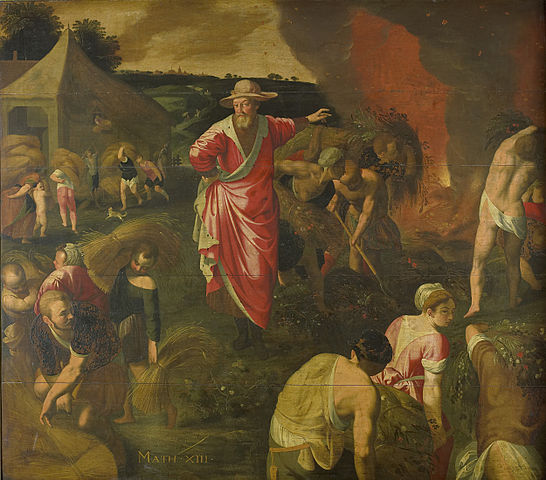First, we're hearing from the Wisdom of Solomon, part of the Greek version of the Old Testament (sometimes called the Second Canon or the Apocrypha, which just means hidden or obscure writings). The full passage is here, though we're skipping verses 14-15 for some reason. I love the Wisdom of Solomon because it is both very philosophical in an ancient manner, influenced by Greek thought and culture, and very devout. This week we will hear about the way God's power and God's mildness interact:
For your strength is the source of righteousness,
and your sovereignty over all causes you to spare all.
For you show your strength when people doubt the completeness of your power,
and you rebuke any insolence among those who know it.
Although you are sovereign in strength, you judge with mildness,
and with great forbearance you govern us;
for you have power to act whenever you choose.
Our passage from Romans is about hope, among other things, and the creation groaning in travail until the delivery of the children of God. This is an image Christians have mulled and meditated over for many centuries. The creation has been subjected to futility, for the sake of hope--this is a strange thought. Our world of universal mortality is, in Paul's words, pregnant with something new, and we groan along with the world as we await our redemption. Indeed we "suffer with [Christ] so that we may be glorified with him." This hope, however, is a secret thing. If we hope for what is seen, Paul says, what kind of hope is that? We hope in the unseen--unseen but yet somehow known and sensed within this world of groaning.
Jesus, in a characteristic parable, puts this matter of hope in a very different way. A field is sown with wheat, and at night an enemy comes and sows it with tares. For many historical commentators and artists, this is the key moment in the parable: while the workers sleep, the enemy is at work, following, mimicking, and ultimately marring the work of God. God never builds a church but the Devil sets up a copy of it next door, as Luther put it (more or less). Modern commentators and preachers tend to focus more on what comes next:
The slaves said to him, “Then do you want us to go and gather them?” But he replied, “No; for in gathering the weeds you would uproot the wheat along with them. Let both of them grow together until the harvest; and at harvest time I will tell the reapers, Collect the weeds first and bind them in bundles to be burned, but gather the wheat into my barn.” ’
But the early hearers of Matthew's Gospel may have been listening to something else in this. Yes, they had to contend with divisions in the church (and in the wider Jewish community of which they were still probably a part), which they understood to be the work of a demonic power. But they had no power to uproot the "weeds" around them, being a small and weak community. They needed to understand God's forbearance, and they needed to hope that they would ultimately be vindicated--that among the weeds of the world, they would not be finally choked out of existence.
I must admit that lately I have been struggling with hope as our Scriptures and theology use the term. I am not especially hopeful--using the term casually, I suppose--about the future course of the coronavirus pandemic or, for that matter, the unfolding crises of climate change that the pandemic seems to be mimicking in a miniature, sped-up way. I don't see a way that our institutions will address the problems adequately, our culture and expectations adapt to deep and enduring changes, and our networks of inter-dependence sustain us. I ask myself what my work or anyone else's will mean as we sail straight into what threaten to be major storms ahead.
So it helps to remember that Paul and, in a different way, Jesus are talking about hope in a sense that really excludes the possibility of envisioning its fulfillment. I am dissatisfied by my own preaching and writing when I am left using "hope" as a box stuffed with IOUs, or as a spot on a draft saying "[add more examples here]." Everything else I can talk about practicing or picturing--as something we can do or imagine. Hope is more like an acknowledgment of God's freedom--that God is active in history and in current events and in every detail of our lives, both good and bad, but also beyond them all in ways we cannot comprehend. And just as a cell in a body wracked with labor pangs does not know what will come, and just as an ephemeral flower at the end of its bloom does not know the place it has in a vast and mortal creation, we don't know what God has laid up for us.
Finally, we'll take a look this week at the seventh and eighth commandments: against stealing and bearing false witness against our neighbor. I find myself especially moved by Luther's explanation of the false witness prohibition:
We are to fear and love God, so that we do not tell lies about our neighbors, betray or slander them, or destroy their reputations. Instead we are to come to their defense, speak well of them, and interpret everything they do in the best possible light.


 RSS Feed
RSS Feed